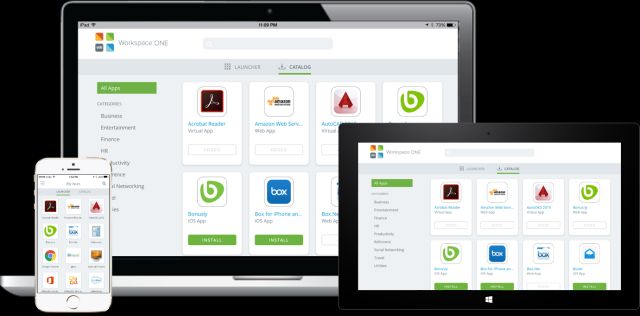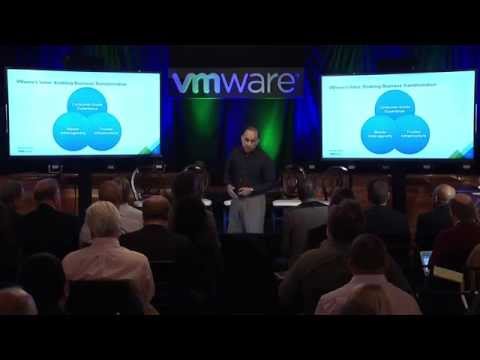
by admin | May 25, 2021 | Business, Large Enterprise, Markets, Technology
 Bengaluru : Cloud infrastructure and business mobility leader VMware on Wednesday announced it had become the first unified endpoint management (UEM) provider with Google’s Chrome device management capabilities.
Bengaluru : Cloud infrastructure and business mobility leader VMware on Wednesday announced it had become the first unified endpoint management (UEM) provider with Google’s Chrome device management capabilities.
VMware Workspace ONE, a digital workspace platform powered by VMware ‘AirWatch UEM’ technology, would enable the customers unify management of Chrome devices, alongside all other endpoints, from a single console.
“As Chrome OS continues to gain momentum, our customers are eager to manage these devices consistently along with all other endpoints, including mobile devices,” said Sumit Dhawan, Senior Vice President and General Manager, End-User Computing, VMware.
“Using Workspace ONE, our customers will be able to securely manage the lifecycle of Chromebooks along with all their other endpoints giving them better security and a consistent user experience across all devices,” he added in a statement.
With new enterprise-ready capabilities from ‘Chrome Enterprise License’, organisations will be able to deliver device policies using customisable assignment of groups.
“Our collaboration with VMware will help us deliver a seamless deployment and management experience, making Chrome devices available across more teams,” added Rajen Sheth, Senior Director of Product Management for Chrome OS at Google.
Chrome device users will even be able to access full Windows desktops and applications and use these devices as next-generation thin clients, helping accelerate the adoption of Chrome devices in the enterprise.
‘Workspace ONE’ will be able to deliver a unified platform to both manage and deliver any app to Chrome devices.
—IANS

by admin | May 25, 2021 | Markets, Technology

Sanjay Poonen, VMware EVP & GM, Details Business Mobility Strategy
New Delhi:(IANS) US-based cloud services and business mobility solution provider VMware on Thursday said that it was looking to capitalise on the $2.3 billion enterprise mobility market in India which is on the rise due to the growing mobile subscriber base in the country.
The total addressable enterprise mobility solutions industry in Asia Pacific, which includes applications, devices, security, middleware, and professional services, is expected to grow from $22 billion in 2015 to $26.7 billion by 2017. The market in India is also slated to grow from $1.7 billion in 2015 to $2.3 billion in 2017 over the same period.
“With Indian organisations paying close attention to the future of business processes in the mobile-cloud era, we believe that India is on the cusp of the next major technology wave in Asia Pacific,” said VMware’s business mobility arm general manager Sanjay Deshmukh.
With a new generation of smartphone-powered workers who have easier access to end-user devices and network connectivity, businesses here are prioritising and reorienting themselves around mobile innovation, apps and services,” he added.
According to analysis firm KPMG, the number of mobile internet users in India is projected to double and cross the 300 million mark by 2017.
The company claimed that its strategy is to free businesses from more than a decade of client-server focused IT which enabled mobile access to a limited number of productivity applications and now deliver a more user and application-centric experience.
The NYSE listed firm has also recently announced new solutions, services and partnerships for its business mobility offerings. “Today, we believe that VMware is the clear leader in business mobility, with a comprehensive portfolio of solutions that will enable organisations to adopt true business process transformation, satisfy their employees’ business needs and drive business agility,” Deshmukh added.
According to analysis firm International Data Corporation (IDC), the Asia Pacific market for mobility is in very early stages, with 80 percent of organisations ill-equipped to harness platform technologies including mobility, cloud, social and Big Data analytics.
“We see the next 18 months as a critical period for companies to accelerate efforts and investment in the enterprise mobility space. Companies are currently placing too much emphasis on devices and BYOD. Our recommendation is that businesses increase their investments in security, middleware and infrastructure, to enable better competitive innovation,” said IDC Asia Pacific’s mobility and IoT head Charles Reed Anderson.
–NewsVoir

 Bengaluru : Cloud infrastructure and business mobility leader VMware on Wednesday announced it had become the first unified endpoint management (UEM) provider with Google’s Chrome device management capabilities.
Bengaluru : Cloud infrastructure and business mobility leader VMware on Wednesday announced it had become the first unified endpoint management (UEM) provider with Google’s Chrome device management capabilities.
